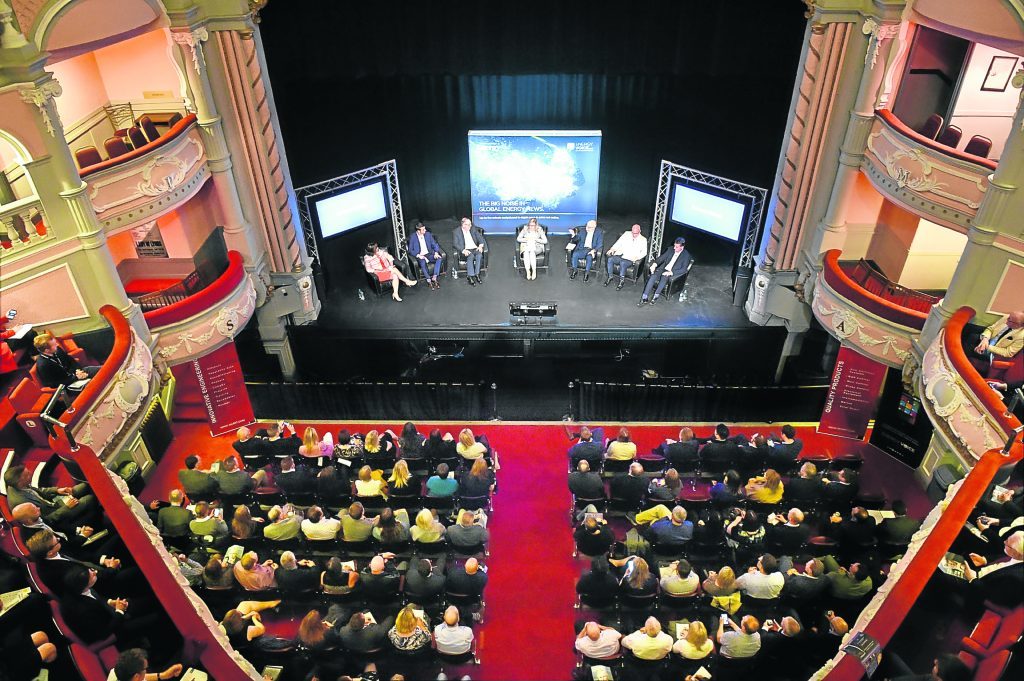
The oil and gas industry needs to put itself “on steroids” to make sure it capitalises fully on the fledgling North Sea recovery, a senior figure has said.
Experts gathered at a summit last night agreed that although much progress has been made pulling out of the downturn, the pace of change remains too slow.
Paul de Leeuw, director of Robert Gordon University’s Oil and Gas Institute, was among speakers at the New North Sea event.
With other regions making huge strides in the sector, he said, North Sea operators had to “drive change a lot harder”.
“What we currently have in place is fantastic, but we really need to do it on steroids,” he told hundreds of guests.
“I think industry is up for it. We have the conditions, we just need to get on with it.”
Senior figures gathered in Aberdeen agreed that the North Sea is in a much better place compared to two years ago and that there was a lot still to play for in the basin.
Among them was Andy Samuel, chief executive of the Oil and Gas Authority (OGA), who said the North Sea industry was “getting to the point” where everyone is “moving in the right direction”.
But Mr Samuel said the pace of the North Sea’s transformation was still too slow and that there was still work to do to change companies’ behaviours.
He was speaking to more than 430 guests at an event organised by Energy Voice, the Press and Journal’s sister website, at Tivoli Theatre last night.
An expert panel was assembled to discuss how North Sea industry had changed since 2015, when Energy Voice also hosted a summit of industry leaders.
Panellists examined topics including cost pressures, exploration, technology and workforce culture shifts.
Mr Samuel said companies had done well to lower operating costs and improve safety performance in the face of sustained low oil prices over the last two years.
He also said an extra 4billion barrels of oil could be unlocked through the development of area plans.
But he said attracting investment and changing behaviours were still two of the biggest challenges facing North Sea industry.
He said that the OGA “had the answers” to help companies get after additional barrels and that he had seen brilliant examples of firms working together.
“But shame on us if we are still talking about poor commercial behaviours in two years,” Mr Samuel said.
Paul de Leeuw, director of Robert Gordon University’s Oil and Gas Institute, said the sector was punching above its weight in terms of its share of global production.
But Prof de Leeuw said other countries were “not standing still” and that North Sea industry needed “steroids” to take the pace of its transformation to the next level.
He said: “There is a huge amount of additional competition coming and we really need to think about how we play a worldwide game.
“We need far more activity going in and to drive change a lot harder.
“I think what we curently have in place is fantastic, but we really need to do it on steroids.
“I think industry is up for it. We have the conditions, we just need to get on with it.”
Colette Cohen, chief executive of the Oil and Gas Technology Centre, said the oil industry needed to embrace the digital revolution in a way that it had failed to do so far.
Last night’s event, which was titled The New North Sea, was held in the run-up to the Offshore Energy conference in Aberdeen next week.
It was sponsored by Burness Paull and supported by Rig Control Products.
Other panellists included Dave Lynch, BP’s vice president of reservoir development, Neil Sims, North Sea vice president at international oilfield service group Expro, and Nick Dunn, vice president, subsea services and offshore equipment at Baker Hughes a GE company.
Energy Voice editor Rita Brown, who chaired the panel, said last night’s superb turnout was a clear reflection of people’s appetite to know where the industry has to go and how far off the mark it still is.
Recommended for you

